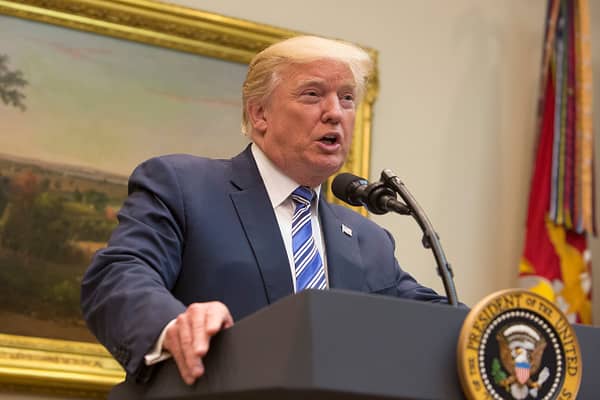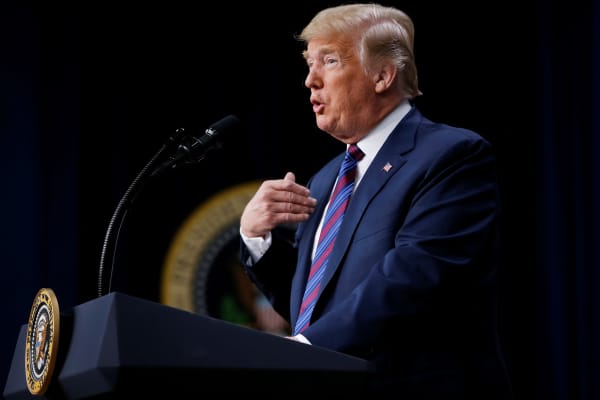
In a trade war, it's consumers who may lose
- A battle between the U.S. and the rest of the world over tariffs could mean higher prices
- for shoppers later this year.
- "American families are caught in the middle," says the National Retail Federation's
- Matthew Shay.
Patrick T. Fallon | Bloomberg | Getty Images
Customers walk with Foot Locker shopping bags on the Third Street Promenade in Santa Monica, California.
As trade tensions between the U.S. and the rest of the world escalate, expect to take a hit at the cash register.
“A tit-for-tat trade war has erupted and American families are caught in the middle,”
Matthew Shay, the president and CEO of the National Retail Federation, said in a statement. Shay also called tariffs "taxes on consumers."
Matthew Shay, the president and CEO of the National Retail Federation, said in a statement. Shay also called tariffs "taxes on consumers."
In the latest clash between Europe and the U.S., the Trump administration announced it would move ahead with metal tariffs on the European Union, Mexico and Canada.
The EU responded to duties on steel and aluminum with retaliatory tariffs on more than $3 billion worth of U.S. goods including playing cards, peanut butter and orange juice.
The president previously approved tariffs on flat-screen televisions, solar panels and some household appliances, like dishwashers and washing machines.
The Office of the U.S. Trade Representative released a list of productsthat will be subject to additional tariffs. Here are some of the consumer-related goods on the list:
- Dishwashers
- Water filters
- Parts and accessories of printers
- Copying machines
- LEDs for backlighting of LCDs
- Radio receivers
Trump said on Twitter that "trade must be fair and no longer a one way street" and "in the end it will even out."
But in the meantime, if other countries buy fewer of products from the
U.S., like orange juice, because of the higher costs as a result of new tariffs, that may mean more inventory and slower sales for farmers and producers here, which will cost jobs in the long run.
U.S., like orange juice, because of the higher costs as a result of new tariffs, that may mean more inventory and slower sales for farmers and producers here, which will cost jobs in the long run.
On the flip side, U.S. companies dependent on imported aluminum and steel — say for the production of cars, appliances and canned food or drinks, like soda and beer — will have to absorb the higher costs somehow, which could also mean layoffs or price hikes on finished products down the road, according to Michael Salerno, lead director of global banking at First National Bank of Omaha.
There will be some lag time, Salerno said, as companies grapple with the
challenge, but it could translate into “higher prices at the register around the holiday season.”
challenge, but it could translate into “higher prices at the register around the holiday season.”
One estimate puts the effects of this trade conflict at 250,000 in lost jobs and $210 in higher costs for an average family.
"A tit-for-tat trade war has erupted and American families are caught in the middle."-Matthew Shay, president and CEO of the National Retail Federation
“At a time where wage growth has been pretty limited, every dollar counts and price inflation means fewer dollars consumers have left to spend
somewhere else,” said Greg McBride, the chief financial analyst for
.com.
somewhere else,” said Greg McBride, the chief financial analyst for
.com.
Price inflation will also take a toll on consumer confidence, he added, even though Americans now feel more optimistic about their economic
prospects than they have in a long time.
prospects than they have in a long time.
“The widespread instance of tariffs is something that could become a headwind to the economy,” McBride said.
The new CNBC All-America Economic Survey shows that for the first time since Trump took office, the majority of Americans approve of his handling
of the economy.
of the economy.
Still, "higher prices for everyday essentials and lost jobs threaten to sap
the energy out of the strong U.S. economy just as most Americans are starting to enjoy the benefits of historic tax reform," said the NRF's Shay.
CNBC.com
Trump's tariffs on US allies will shrink the savings Americans gained from tax cuts
- The U.S. says it will impose tariffs on steel and aluminum imports from allies such as Canada, Mexico and the European Union.
- While the White House acknowledges that these measures will lead to higher prices, the
- administration argues the effect will be tiny.
- But combined with additional tariffs on Chinese imports and retaliatory steps taken by U.S. allies, economists across the political spectrum agree these levies will have a negative impact.
President Donald Trump has embarked on an unorthodox follow-up to cutting the taxes American families pay: raising the prices of goods they buy.
Higher prices will result directly from tariffs the White House plans to impose on steel and aluminum imports from allies such as Canada, Mexico and the European Union as well as other countries. The White House acknowledges that effect, while arguing the price increases will be tiny.
But combined with additional tariffs against other imports from China and retaliatory steps by our trading partners, the measures Trump announced promise to make an impact. And mainstream economists across the political spectrum agree it will be negative.
"Unambiguously bad," said Douglas Holtz-Eakin, a Republican economist who advised President George W. Bush. "The only question is how big."
"Anything that's manufactured — prices will rise," added Mark Zandi, an independent economist at Moody's Analytics.
Zandi estimated the net effects of trade conflicts Trump has initiated at 0.2 percent in reduced economic growth, 250,000 in lost jobs, and $210 in higher costs for an average family. Such a reduction in growth would wipe out half the projected boost in growth from the tax cuts Trump and the GOP Congress enacted last December.
Trump concedes his trade policies will cause "a little pain." But he insists that 25 percent steel and 10 percent aluminum tariffs will benefit the country by boosting the domestic manufacturing of building-block products crucial to economic vitality and national security.
His argument collides with 21st century economic reality in multiple ways.
First, the number one source of U.S. steel imports is Canada, the closest of economic and national security allies. An indignant Prime Minister Justin
Trudeau noted Canada's side-by-side cooperation in, among other crucial U.S. battles, the Normandy invasion of World War II. The next three biggest sources are friendly Brazil, South Korea and Mexico.
Second, as past tariff experiences have shown, jobs lost in industries that pay more for steel and aluminum inputs (think cars and beer cans) will far outnumber those gained from tariff protection for steel and aluminum manufacturing.
Third, counter-tariffs by trading partners will damage American export
sectors such as agriculture — exports that disproportionately benefit Trump-allied heartland states represented by fellow Republicans. Sen. Ben Sasse of Nebraska, echoing other GOP lawmakers, observed simply, "This is dumb."
sectors such as agriculture — exports that disproportionately benefit Trump-allied heartland states represented by fellow Republicans. Sen. Ben Sasse of Nebraska, echoing other GOP lawmakers, observed simply, "This is dumb."
Bad math
"They're just not doing the economic arithmetic correctly," Holtz-Eakin said.
The arithmetic could get worse. Also in the name of national security, the Trump administration is investigating whether to slap 25 percent tariffs on imported cars.
That would boost prices of products on which Americans spent $180 billion in 2017. There's no assurance the expensive cycle of tariff escalation would stop there.
Overall, inflation in consumer prices remains modest. In an economy that has reached full employment, wages are growing slightly faster.
Yet the working-class Americans that candidate Trump courted so intently face the burden of gas prices that have risen sharply since last year. Average pump prices nationally, which averaged $2.45 per gallon as he took office, reached $2.98 in May.
Zandi calculates that the average American family will pay roughly $320 more this year as a result. Combined with higher prices due to tariffs, that
would wipe out more than half the average tax cut of $930 that families in the middle 20 percent of American earners would receive in 2018,
according to the Tax Policy Center.
would wipe out more than half the average tax cut of $930 that families in the middle 20 percent of American earners would receive in 2018,
according to the Tax Policy Center.
And it would make net losers of families earning less than that. The Tax Policy Center estimates that the bottom 20 percent of earners will receive an average tax cut of just $60 this year; the 20 percent of earners above them, just $380.
Uncertainty over the economic consequences adds risks to business investment and unsettles financial markets. The S&P 500, Nasdaq and Dow Jones industrial average all closed lower Thursday following the tariff announcements.
That underscored one thing that Trump's 2018 economic policies have helped make cheaper: stocks. For the first five months of the year, the Dow is down 409 points, or 1.6 percent.
WATCH: US tariffs on Canada, Mexico & EU take effect
REF



No comments:
Post a Comment